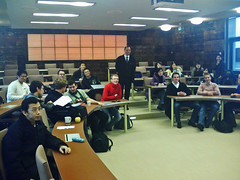Frankfurt.
The next keynote at Prosumer Revisited is by trend researcher and journalist Holm Friebe. He begins by referencing de Certeau, and describes prosuming in the first place as the creative repurposing of existing products; from this, though, we've also moved on to the creation of new artefacts by users. There is a semantic shift in the description of prosumption, then - a shift further towards various forms of DIY production.
What's happening now is that this form of DIY production is becoming a brand in its own right - and this 'DIY brand' may be the most important brand of the 21st century. This is visible for example in 'crafting', the latest iteration of the arts and crafts movement - in effect an extension of online DIY and produsage (and importantly also of its its collaborative, community-based aspects) into the offline world. In the long tail of interests, some of this is becoming an industry in its own right as well, of course - the arts and crafts marketplace Etsy is a clear example for this, and it's even begun to operate its own (offline) training courses.














